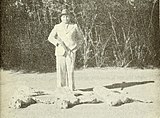I am brimming with
ideas. They come to me everywhere I look, everything I see. If I think about it
enough, almost any subject will suggest an idea of some kind or another. My
head is so bursting with them that I can't even get them all down on paper. They're
always-present and ever-elusive. I scribble them in my bedside notebook before
sleep claims me and they leak from my skull with the bleary morning light. The
only sure way to catch them is to write them down. And if I don't anchor them
down in time they evaporate into steam like dew beside a fire.
But the real problem
is, even after nailing them down with a solid two-sentence anchor: what do I do
with all these ideas?[1]
Because a new idea
isn't developed. It isn't clear, nor it doesn't have the maturity of a
well-rounded argument. Instead, it's vivid and bright and has a few principles
of nature or science, famous faces and a couple of stirring one-liners. But
that's it. Like a virus, an idea is powerful, but it won't go anywhere without
a human host. Like an embryo, it has incredible potential, but will go nowhere
if it's not properly incubated. Before it can be effective, it has to be
refined, restructured to flow well, connected to other sciences and great
thinkers, given analogies and anecdotes that will resonate with a wider human
audience, and finally polished to a gleaming sheen that will glisten in others'
minds long after you are gone.
But I don't have
time for that.
So what do I do with
all these ideas?
Hoard 'em, mostly.
It is the sad truth. I would love to turn them all into glorious works and send
them out into the world, but that takes time and thought and effort, and as
previously stated, I have more ideas than I can develop. So they pile up. Only one
in maybe fourteen or fifteen ever see more than a two-sentence paragraph. Sad
in'nit?
Perhaps the real
reason they pile up is that I don't often stick with one long enough to refine
it. The minute I start to refine one idea, it sprouts three more and I just go
around collecting more and more idea seeds without ever finishing planting any.
This is a common problem seen in microcosm in my essays. I will have a
"bush" of ideas. A huge, overgrown, monstrous bushy-bush of ideas
that are all connected, but that don't flow in any central theme or purpose.
It's just kinda growing everywhich way. I see this in my papers, and my
blogposts[2]. Like this one. I was
shooting for a three sentence intro, and then the pics and a sweet goodnight
and off to bed. Yeah. Didn't happen.
How to fix my
ineffectual, rambly bush?
I don't want to stop
catching ideas. I just want to order and develop them more. So maybe I can...
- Plan the
trunk - Figure out what I want to do from the
outset. Set my argument-tree[3] growing right while still malleable, and have
all the branches tying straight back to the central theme. Cohesive,
constructive, purposeful and direct. Might have to throw away the first
draft entirely, and start from scratch, but it's possible.
- Prune the
bush - In the
words of the mortal Stephen King[4] "Kill your darlings, kill your darlings,
even when it breaks your egocentric little scribbler's heart, kill your
darlings." Cut out the fluff. Write to tell yourself the
story/argument, edit and cut so it is only the story (or argument). More is not better. A
knife point cuts better than a brick.
Yeah, I think that
would help. We'll see if I can get a handle on my big-bushy multi-thematical
rambles and instead churn out high powered punch-you-in-the-face essays made of
nothing but thesis statement and muscle. Until then, enjoy the rambles! They're
fun, and the ideas are all so great, how could you pick only one?[5]
[1] Maybe by now I
should mention that not all ideas are good ideas? Some of them are just ok. Or
bad. Sometimes it's hard to tell until you've worked with them a bit.
[2] Seriously, if
you want to see what I mean, read some of my other posts. I would point you to
the couch one, but I don't think that's fair. The point of that whole exercise was to write for 30
uninterrupted minutes without any plan or editing.
[3] My
argument-tree-metaphor
[4] Never read his
horror, but I really liked his book On Writing
[5] These pictures
show just some of the list of possible
topics for the blog. The "seeds" tab is now the running list of ideas
and scraps of blog posts. I think I have five pages in it? We're not even
getting into my other sections-- or the stuff in my paper notebooks that I carry around. Yikes.








